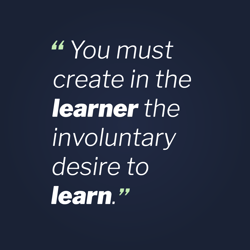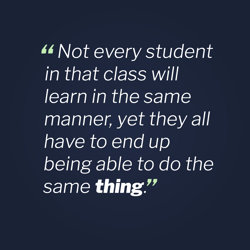As a training company we often talk about how to teach individuals our content. But we also need to discuss how we train the people doing the teaching. How do you create confident experts that can turn around and effectively train their own people? Randy Revling joins Al on the podcast today to discuss his decades of experience training law enforcement and corporate instructors. Utilizing engaging and brief activities, and frequent self-evaluations are the basis for Revling’s success. Listen in!
Host: Al Oeschlaeger, Vistelar
Guest: Randy Revling
Subscribe to our podcast on Apple Podcasts , Stitcher, Google Play or YouTube
Al Oelschlaeger:
Good evening, Randy. Good talking to you again.
Randy Revling:
Thanks, Al.
Al Oelschlaeger:
We’re going to be talking about instructor development and as I’ve introduced you, you have a wealth of experience of that going back probably more years than you want to count.
Randy Revling:
Yes. It’s been a while.
Al Oelschlaeger:
I think you and I are like within a few months of being the same age. We got a bunch of years under our belt. Give everybody [crosstalk 00:00:33]. Exactly. It’s just pure, good experience. So give the listeners a little summary of what you’ve done over the years relative to instructor development. But what makes you unique is you’ve been specifically in the psychomotor-skill realm. Not teaching algebra and accounting, but teaching people to do stuff.
Randy Revling:
Well, it started with all the psychomotor skills back in the mid-eighties in the instructor schools. I’ve been an instructor trainer in the law enforcement, psychomotor skill area, starting with firearms, all of them. I wrote the manual for handguns, a different manual for sub machine gun. And another one for what most people call assault rifle. And also police shotgun. In addition to that over the years, defense tactics.
Randy Revling:
And as the years went on and also verbal skills, a lot of that and [inaudible 00:01:39] contacts. I get a lot of law enforcement related, but also I began teaching to corporations maybe 25 years ago. And those corporations, while they weren’t teaching anybody to shoot anybody or beat anybody up, but what they’re interested in is using verbal skills, body language to promote the goals of the agency. And no surprise to me at all the concepts that made our physical skills training of instructors very successful, probably the most successful in the country, proved very important to these companies as well. Banks, a lot of banks, paper mills, other manufacturing facilities, factories-
Al Oelschlaeger:
Healthcare?
Randy Revling:
Human resources. The most important thing, and again, our discussion tonight is probably going to be limited to why we would want to do instructor development in the first place. What is special? Why does a person who is already good at their skill, why should they go and spend five days in instructor development? Well, the underlying thing, now there’s many things that must be learned in those five days. How do people learn? We understand there’s different learning styles and a great deal of information on all of various matters by which we evaluate skills and all the different levels. A lot of other things.
One Fundamental Issue
Randy Revling:
But the one fundamental issue is this. You must create in the learner the involuntary desire to learn. And once you learn how to do that, once you learn how to bring people along, not force them because no one can be forced to do anything. Your instructors will become very successful. Now when they’re in the instructor development class, they are practicing these concepts daily. And the most frequent comment is, “I wish when I went through instructor school,” because most of them have had other instructor schools. “I wish I would’ve learned this.” Or they’ll say, “Why wasn’t I taught in this manner years ago?” And some fortunate but they weren’t. But now we have the opportunity to help an agency, whether it be law enforcement or anybody else in this country. If you’re teaching somebody concepts and their job is driving a bus, those instructors will benefit from this instructor development.
Al Oelschlaeger:
Yep. Well, you asked the question why. I think there’s probably people listening that would say they’ve sat through a lot of training that’s just terrible, right? Boring. They don’t learn anything. Or they might get all excited about something being presented. But when they leave and they go home and they go, “What did I really learn? What did I bring back to my job?” So independent of all of the theory side, my experience has been, people generally have a bad experience with training. They go and sit and maybe they’re forced to do it. Maybe they’ve signed up for something, but they go, “Wow, that just was not worth my time or energy.”
Randy Revling:
Well, unfortunately, there’s all kinds of reasons why it turns out that way. But again, in a proper instructor development class, they will learn how to do things in a matter in which when the person leaves their class, they hit the deck running, they’re ready to go. And they feel that the class was a benefit to them. As a matter of fact, it’s hard to get them to leave on the last day.
Al Oelschlaeger:
There we go. Yep. So for the listeners understanding, you primarily teach somebody that’s otherwise a trainer. They are already experts in what they teach. They know the material. They maybe have been teaching for years, maybe a short period of time, but they’ve been in front of classrooms, they’re teaching a whatever topic, bus driving or firearms or whatever, and now your goal is to take them to the next level of being a better instructor. By the end of your class they get to the point where they just know how to do this better and people end up learning.
Psychology of the Mind
Randy Revling:
They learn several things that they probably didn’t know before. But one thing is simply the psychology of how the human mind actually assimilates behaviors and then how the mind controls the body to actually carry those functions out. And again, it’s all linked to their actual job. When we do these instructor developments, I use the example of someone driving a bus. Well, that entire week is all about bus driving. It’s all about it. It’s all about the customer. It’s all about the skills that they need. So the class, first of all, must be very specific to the learner. It’s got to be something that they actually do want to experience first-person experiential.
Al Oelschlaeger:
Randy, the principles, I mean your point that you’ve been to all kinds of industries, firearms, law enforcement. I think you also did … didn’t you go around the country doing fitness?
Randy Revling:
13 years at Northwestern University, traveling throughout the country as well as about five or six one week courses a year on campus at Northwestern, Evanston, Illinois. Big 10 school. But there’s been a lot of other companies and factories.
Al Oelschlaeger:
But all that at the end of the day, the underlying principles are the same. Doesn’t matter what the psychomotor skill is, it’s the underlying principles are the same on how you teach. And then what you’re saying is the specifics of what they actually are doing that week. It needs to be targeted to their, job duties so that they’re not just learning a bunch of theory. They’re learning [crosstalk 00:07:54].
Not-So-Great Training Story
Randy Revling:
That’s correct. An unfortunate example where it was a state that took control of training for state employees. And they said, “Well being as many of you have not had instructor training previously, and you may not even have training in some of these skills, we will spend this week of instructor development to teach you how to make a chocolate chip cookie.” And they spent the entire week doing that. Now of course, you know, you know that it turned out to be a disaster, whereas they had good people and all they would have had to do is make this thing practical and relevant to that individual. You know, it starts with, who did [inaudible 00:08:42]. When they determine what the curriculum was, how was that relevant?
Al Oelschlaeger:
Right. Yeah. It’s funny. I think you know, I taught university for three years. I have a Masters and I applied to get this job and they said, “Yeah, Al. Come in and teach this class.” And it was in the marketing department and they said, ‘Here’s the syllabus, here’s the book and here’s 80 kids, and go teach.” And now that I’ve been through your course, I go back, I mean, it’s a big university. I go, “How did they let me do that?” You know, I think I did an okay job, not because I understood anything about how to be a good instructor. I was making it up as I’m going. I think we’ve all had that experience at university classes, some personal development class, whatever, you just go, “Who taught this person how to teach a class?”
Randy Revling:
[crosstalk 00:09:44] Not that we want to get into politics, but there are currently some politicians who are proposing that they would pay off student loans. And the only reason that people are worried about their student loan is they didn’t learn anything in college by which they can make some money.
What to Expect from Randy's Classes
Al Oelschlaeger:
Exactly right. Yeah. I’m hoping that none of those kids were in my class, but they probably were. Let’s talk about the specifics of what you do. It’s generally five days, but I think it’s sometimes shorter, but just give an idea for what you do in class. What, what kind of things do you cover?
Randy Revling:
There’s a long list, Al. Let’s go over the high points. It starts out with asking the students, “What are you here for?” You’ve got to hear it. You know, certainly there’s a bit of an introduction before that to stimulate them to be thinking of along these lines. But we need to know what their goals are and we keep track of them. We write them down. And when those goals appear to be spot on like they’re focused, that is an incredibly important thing and it needs to be in the mind of whoever’s teaching this class throughout the week. This is where we’re moving toward, we’re helping them to assimilate the behaviors that are going to allow them to lead others toward this.
Randy Revling:
So starts off by having people in that class that belong there. Now they have the skills needed to do the task, but they don’t necessarily, and probably almost certainly don’t have the instructor skills needed even if they’ve been through other instructor programs. Once we’ve determined what we’re all doing there.
Al Oelschlaeger:
But that Randy, I’m just saying that’s the same thing you do with your teaching now.
Randy Revling:
[crosstalk 00:11:54] They’re going to be with us all week long.
Al Oelschlaeger:
[crosstalk 00:11:55] same approach to use that you’re teaching them to use.
Randy Revling:
75% of this class they’re out of that chair and they’re working and when they’re working, they’re teaching. Now certainly they’re going to have a coach with them, but a coach is a peer. We’re heavily involved with peer instruction, peer evaluation, peer coaching. An important aspect I think that a lot of instructors think is that they have to utilize their energy to teach people. Their energy goes to determining what are the needs of my employees in a job place? How do we evaluate those behaviors that are out there? Then they must create a lesson plan identifying these behaviors and how it’s going to be taught. Then you need to determine the appropriate evaluation criteria by which you determine if this person’s passing their class. And not only is it summative evaluation, how will we know that they passed on the last day, but it’s also formative evaluation. How are we moving along toward our goals?
Different Learning Styles
Randy Revling:
So these are some of the concepts that they’re learning in our class. They also must learn about different learning styles. Not every student in that class will learn in the same manner, yet that all have to end up being able to do the same thing. So there’s different routes that we take and everybody hears it. Everybody hears everything and you don’t necessarily have to know which person in this class is more tactile than others, for example. You need to create a learning environment in which all learners can learn. Once we are doing this, we’re moving along, each day advances further into the curriculum. Each day they’re doing more. Each day they’re becoming more competent in themselves and the receiving feedback and they learn about feedback and they learn that negative feedback does nothing more than enhance the negative behaviors. That would just give an attentional flourish.
learning styles. Not every student in that class will learn in the same manner, yet that all have to end up being able to do the same thing. So there’s different routes that we take and everybody hears it. Everybody hears everything and you don’t necessarily have to know which person in this class is more tactile than others, for example. You need to create a learning environment in which all learners can learn. Once we are doing this, we’re moving along, each day advances further into the curriculum. Each day they’re doing more. Each day they’re becoming more competent in themselves and the receiving feedback and they learn about feedback and they learn that negative feedback does nothing more than enhance the negative behaviors. That would just give an attentional flourish.
Randy Revling:
So what we’re going to do is we’re going to teach them how to evaluate and most importantly, we’re going to teach them how to self-evaluate so that they can teach their students and the officers, their workers, whoever they’re training to do the same thing. And the purpose of self-evaluation is not in training. We don’t do a single thing in training for the purpose of training. Everything that’s done in training has done for the purpose of how are we in the job place. And when they’re in a job place, they must have the ability to self-assess accurately. Most people have horrible self-talk and this class teaches people how to correct that to be able to appropriately identify the areas of which they need improvement, but most important, identify the areas of which they’re doing well. Then they can take their energy and they can focus it on the areas of which they need to actually improve.
Randy Revling:
That need to go read a book. Do they need to take a class? Do they need to watch another person? Do they need to watch a lead person in the workplace? And it’s through this self-assessment that people will grow and this is strongly encouraged. I do it every day throughout this class and there’s different levels of that as well. You can look at Bloom’s taxonomy and we’re not going to get in to depth in each of these different areas, but just as our topic this evening, why do we want an instructor development? These people who are attending this class who will go back to their workplace and teach others, must be able to create a learning environment where people can actually move toward and become like the goal. Assimilate behavior with those who already have the goal. And a huge part of that is self-talk.
Al Oelschlaeger:
And Randy, when I went through your class, I learned a massive amount, but that was probably the biggest takeaway was that whole point about how a lot of people in these kind of roles, they go back to work and they beat themselves up all day long. What’d I do wrong? Their supervisors yelling, “You did wrong.” It’s just constant beating up instead of thinking about what did I do well and what can I do better next time?
Al Oelschlaeger:
You do an extremely effective job of getting people to think in that whole … I remember you drawing that graph about here’s where they start and here’s where they’re ending. And you’re constantly keeping them within their comfort zone but right on the edge of their comfort zone and then moving them towards this path of where you want them to be at the end of the training class and you need to just keep moving them there. If you start beating them up and tell them they’re doing stuff wrong, you’re not moving them in that direction. [crosstalk 00:17:05] They thinking positive about what they’re doing and again the weakness and [crosstalk 00:17:10] it is thinking I’m really good at this.
Randy Revling:
When we develop these [crosstalk 00:17:14].
Al Oelschlaeger:
And I’m going to go back and trust when I’m on the job.
Using Performance to Build Self-Confidence
Randy Revling:
Is actually based upon performance. Only performance can actually improve someone’s real self-confidence. And like you mentioned, with the comfort zone, it’s true. We don’t have anybody ever leave their comfort zone. We actually expand the comfort zone until it encompasses the actual original goal and then we just set another goal and keep moving. And you mentioned, it does change things. There is a paradigm shift that occurs within people which is consistent with the fourth level of evaluation and that paradigm shift has been noticed by everybody.
Randy Revling:
I’ve had many letters from executives, administrators of agencies and companies saying, “Well, the class, even when we weren’t doing instructor development, we were just doing instructor schools in this manner.” They’d say, “It changed this entire company. It’s different here now. It’s different here.”
Al Oelschlaeger:
They brought back this whole framework of-
Randy Revling:
In everything.
Al Oelschlaeger:
Constant improvement. Positive self talk.
Randy Revling:
From day one, they hear the term-
Al Oelschlaeger:
Good self evaluations-
Randy Revling:
This is how we are [crosstalk 00:18:47] that’s not in their subconscious. That’s not one of their actual subconscious behaviors. If they have to use their conscious mind, it’s going to fade quickly. But if it’s in the subconscious, there is practically indelible, but it takes time. It takes emotion, it takes repetition. Hopefully where there’s more emotion, we need less repetitions and yet the motion must be positive because a negative one can actually be contraindicative for what we want.
Al Oelschlaeger:
And Randy, as you know, we formed [Vislar 00:19:38] back in 2009. I’ve been through a lot of conflict management training of our own. I’ve taught a lot of conflict management training and back during the summer I went to your class, and I won’t describe the details of the exercise, but you took us through an exercise and it was about five minutes. Not even that, four or five minutes.
Al Oelschlaeger:
I can honestly say that in my 10 years of learning this stuff and teaching it, I learned more in that five minutes than I’ve learned in any other lengthy time period sitting in class. It was all the reasons you described. The emotion was there. I was doing it myself. [crosstalk 00:20:20].
Randy Revling:
You also hit on a very important point. [crosstalk 00:20:20] 75% of the time they were out of the chair and they’re doing something and they’re active.
Al Oelschlaeger:
And it was fun. I enjoyed it.
Randy Revling:
Working toward their goals. Those exercises usually only do last about four to five minutes. Anything longer than that creates confusion. And probably a lack of organization and counter-productive as well.
Al Oelschlaeger:
It was a brilliant little experiment. I’ll probably remember it the rest of my life. Sometimes I don’t have great historical memory-
Randy Revling:
But Al, we’re at 21 minutes and our goal was to have a discussion on why we should have instructor development.
Al Oelschlaeger:
I just go, “Wow, there it is.”
Randy Revling:
I think perhaps in the future we could do some podcasts on some specific areas of the IDC and whatever you think.
Al Oelschlaeger:
I just want to spend a couple more minutes and ask how well does, everybody knows now, both of us are a little more mature, so we’re not millennials or anything. We’re not coming out of our teenage years. You obviously have a huge depth of experience. Where did this come from? How did, where did you decide that [crosstalk 00:22:01] . Wealth of experience or academics or what? How did that happen?
Background
Randy Revling:
I have a background in psychology and my career was successful and what worked well in my own job place and my own experience, I was 28 years at a Sheriff’s department. The last nine years I was a captain in charge of the patrol division, ran a SWAT team for 12 years. I was SWAT for 18 years. And there’s something about enabling somebody to take someone else’s life and to still survive after that. And as we developed in our officers the ability to do that even though no person on earth in their right mind would want to, and we didn’t create anybody who wanted to.
Randy Revling:
But when you create in someone the ability to do that, the most extreme thing that can be done on the earth, it takes a lot. And that’s where it started, Al. That’s where it started. And to create a balanced
person that can learn those skills and still lead quality life back. Their lives improved because of the class and they were confident, calm professionals, not edgy, not nervous, not stressed out.
The Importance of Good Training
Randy Revling:
And from there is where all this started because it’s so incredibly important that people would know that law enforcement is not a stressful job. If you prepare people properly, if they’re trained correctly, when the critical things happen, the family disturbances that everybody dreads and such as that, that’s when they’re the most calm. That’s when they are right where they have prepared themselves to be. They’re functioning legally, ethically and properly within the guidelines of their agency and it leads to a very successful career. And then of course as the years went on, we just kept learning more and applying it in more areas and it turned out to be quite successful.
Randy Revling:
After 28 years of law enforcement of which 21 of those I was a teacher.
Al Oelschlaeger:
And you were a certified teacher [crosstalk 00:24:41] at one of our tech colleges.
Randy Revling:
… college in our state and in many other States for that matter, I guess 48 of the 50 states all while is that the sheriff and when I retired I went into 14 years of full time teaching for a college and it went very well. In fact, it was so successful they didn’t know what to do with their success.
Al Oelschlaeger:
[inaudible 00:25:22].
Randy Revling:
Started at 13 and ended up at 16.
Al Oelschlaeger:
You’ve got to share that data because it was a tech college and it had a Police Academy as part of it. And that was what, 12 weeks, 16 weeks Police Academy? How long was that?
Randy Revling:
The other academies statewide [crosstalk 00:00:25:40].
Al Oelschlaeger:
I can’t quote it, but your statistics at that tech college compare to the other tech colleges in terms of your [crosstalk 00:25:46]
Randy Revling:
We would track them and about 10 to 20% depending on the school. We had 85% every year. Every year. Some was higher.
Al Oelschlaeger:
So 10 to 20 years. [crosstalk 00:26:09].
Randy Revling:
Law enforcement would send out surveys.
Overwhelmingly Positive Results
Randy Revling:
But a point that I think is even more critical and that is the survey went to the agency and we want to know how that officer’s doing after one year of employment also. So we didn’t just let go of them and we really had a lot of great feedback on these people. Not only were they getting hired, but they were retaining the job. So it really worked out well.
Al Oelschlaeger:
Fascinating stuff. And the fact that you’ve been able to, just luck or whatever, but I’m sure you proactively went out and made this happen. But the fact that you’ve been in so many different industries and teaching trainers of so many different job duties, from healthcare workers to factory workers to HR, to law enforcement, firearms, fitness. We always talk about here at Vislar about how human behavior is human behavior and you know, at the end of the day it is [crosstalk 00:27:30] Randy Revling:
One of the places is a pizza crust company had about 400 employees. Big company-
Al Oelschlaeger:
Fascinating to see how that applied to career-
Randy Revling:
Those administrators were falling all over themselves because of the success that followed that.
Randy Revling:
That’s it.
Al Oelschlaeger:
You were teaching trainers how to teach people to make pizza crust, is that right? Or was it … and they did better at it. I love it.
Al Oelschlaeger:
Well as you know, I was just down, it was just one of the more fun trips I’ve ever had. We were down in New Orleans teaching bus drivers our conflict management skills. And I don’t know if anybody’s ever been to New Orleans, but it’s like the friendliest place. I’ve been there a few times for business trips but I would go there in a minute because everybody is so incredibly friendly and it was just a blast. But it was fascinating to deal with bus drivers. Not a profession I dealt with in the past and we got to spend 11 days together doing different kinds of training. Just fascinated. They got trolley cars and buses, and again you’re in New Orleans so they’ve got some different rules down there on how people party than we have here in Wisconsin. Made it quite fun.
Al Oelschlaeger:
I’m sure you had a similar experience flying all over the country dealing with the different professions. You just learn so much about how people think and how they think about their job and at end of the day has the same underlying motivations. [crosstalk 00:29:38].
Al Oelschlaeger:
And what I’m hearing is that’s what you’re trying to do is tap into that with the way you teach people.
Randy Revling:
[crosstalk 00:29:44] Managing it. The learner is the one who supplies the energy used for learning.
Conclusion
Al Oelschlaeger:
Yep. Love it. Well, Randy, I love your idea. So I mean this is a nice overview, this whole focus on taking that in structure and getting them clear as to what the goals are and then getting them clear on the fact that when they’re teaching they got to do the same thing. Crystal clear on where’s that student coming from and how do we take them from where they’re starting to being really super competent by the time the class is over. It’s not like something they’re going to, in the class and have weeks and weeks to go figure it out in the careers they were working in, they needed to go the next morning and start doing this stuff.
Al Oelschlaeger:
Yeah. So cool. I love the idea. Let’s get back together and we can talk about some more specifics on how this works. I’m sure as everybody knows, we’re in the conflict management training business, but we’re always looking on how do we do a better job of that because we say it all the time. This is a performance skill. This is not something you sit in the back of the room and study in a book. You got to get up and do it. At the end of the day, when somebody is approaching you with conflict, you can’t go back and say, “Let’s go read about it.” You got to go a deal with the person right there. And they’re in your face and you got to figure out what you’re going to do. And it’s a performance. So the only way you can teach that is in the way you’re describing here. It’s a constant effort to say, let’s get better and better at this.
Al Oelschlaeger:
So, cool. Well, Randy, enjoy your evening. Thanks so much.
Randy Revling:
You’re welcome, Al.
Al Oelschlaeger:
Yep. Take care.








